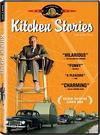Movie: “His Kind of Woman”

Director: John Farrow 1951
There’s a glorious moment in “The Road to Morocco,” the best of the Hope-Crosby comedies. During a scene of mayhem and mischief, the camera cuts to a nearby camel that’s been watching the action. Says the camel: “This is the screwiest picture I’ve ever been in!” Well, that’s only because the camel didn’t get itself cast in “His Kind of Woman.”
The movie starts as a straightforward noir. Mitchum’s a professional gambler just released from 30 days in the Palm Springs jail. He gets robbed, beaten up, then made an offer he can’t refuse: earn $50,000 by flying down to Mexico to lounge around a resort. Of course, he knows it’s a set-up, but he’s Robert Mitchum so he goes. In transit, he meets Jane Russell, a singer (she’s introduced warbling a little ditty called “Five Little Miles from San Berdoo,” the only song ever written in which someone looks forward to arriving in San Bernardino). Sparks fly, but Jane is romancing a hammy movie star, played by perfectly cast Vincent Price. For a long time not much happens, but the movie passes the time just fine. Then bad guy Raymond Burr arrives on a yacht and the real nuttiness begins. Gangster Burr wants a Nazi doctor to make him look like Mitchum so Burr can slip back into the country and do what gangsters do in the movies. Mitchum will of course be killed. What follows is 20 minutes as crazy as anything in “The Road to Morocco.” Burr’s one of those bad guys who doesn’t just do the simple thing by shooting his adversary. No. First he tries talking him to death, then whips him, then decides the Nazi doctor should inject Mitchum with some kind of Teutonic serum that liquefies your brain. Obviously Auric Goldfinger saw this movie. A strapping Mitchum, whose chest actually appears larger than Jane Russell’s, escapes and runs around the yacht shooting steam pipes. Meanwhile, a Shakespeare-quoting Price enlists a ragtag army to attack the yacht. But too many pack their boat and it sinks. They get another boat and manage to help Mitchum, who’s trying to avoid that nasty hypo. If this sounds like a movie with a split personality, it is. Insane producer Howard Hughes wasn’t happy with Farrow’s climax, so he brought in director Richard Fleischer. Hughes also fired the original villain and hired Burr. Shooting dragged on. But somehow it works as a great entertainment. Not available on DVD, so program your TiVo for the next time it airs on TCM. Screwy indeed.




